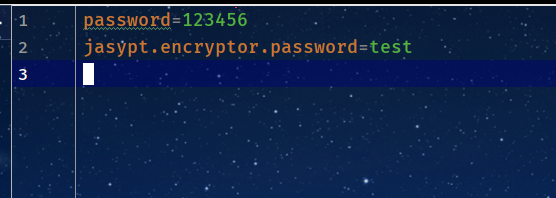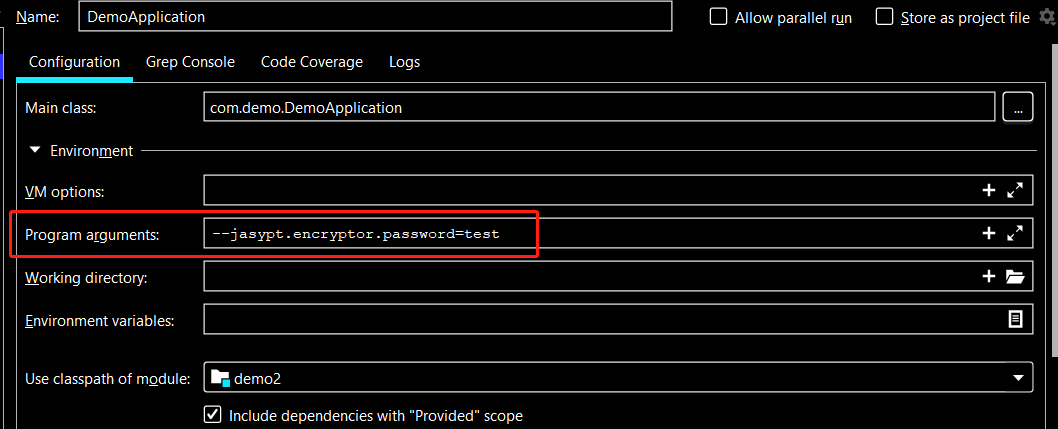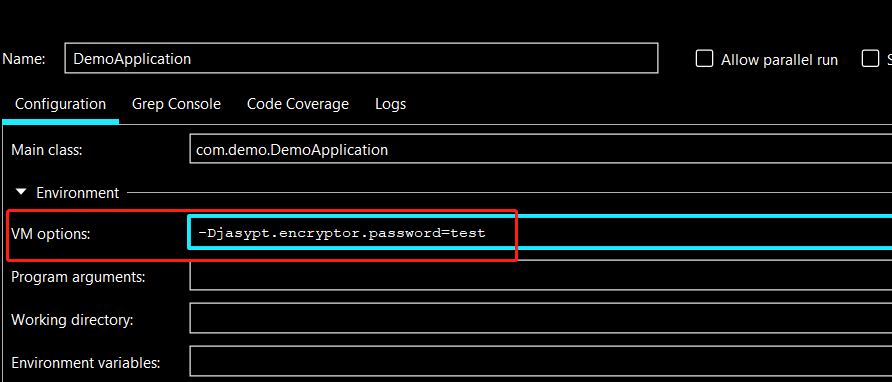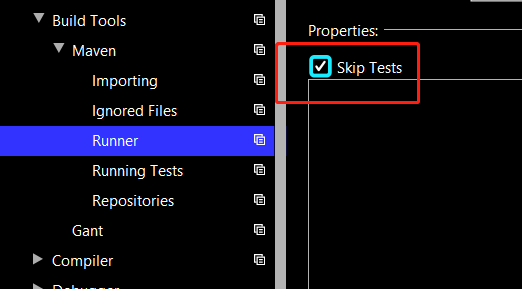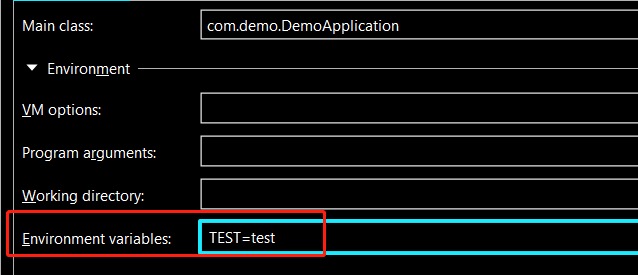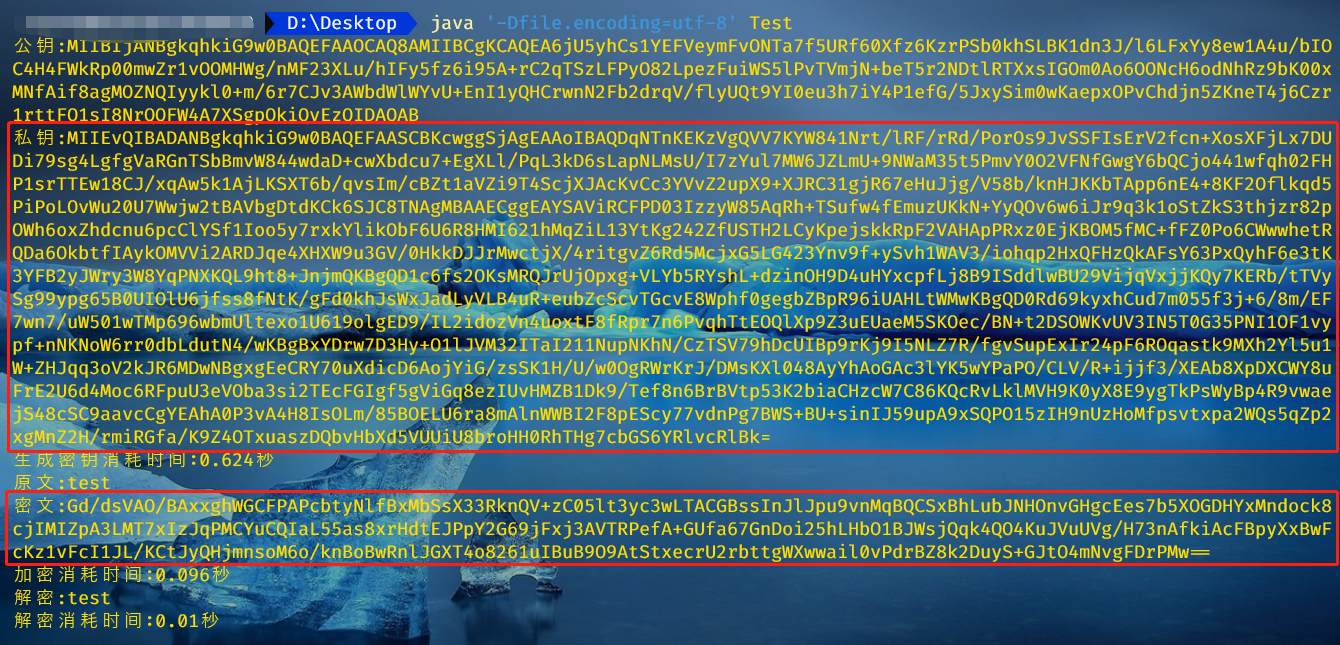加密Spring Boot中的application.properties
1 概述
什么?都2020年了还在Spring Boot的配置文件中写明文密码?虽然是小项目,明文也没人看.
明文简单快捷方便啊!!!
你看直接用户名root密码123456多么简单!!!
…
不废话了,这篇文章主要讲了如何使用jasypt-spring-boot这个开源组件来进行配置文件的加密,包括简单加密以及非对称加密,同时也介绍了使用jar/war部署时如何输入加密口令.
2 简单加密
jasypt简单加密就是直接把加密口令写死在文件中.(好吧这样就差不多大概跟没加密一样… )
2.1 依赖
目前最新版本为3.0.2,具体请查看官方github(戳这里).
<dependency>
<groupId>com.github.ulisesbocchio</groupId>
<artifactId>jasypt-spring-boot-starter</artifactId>
<version>3.0.2</version>
</dependency>
2.2 加密口令
在application.properties中加上:
jasypt.encryptor.password=xxx
xxx为对称加密的口令.
默认使用PBE算法进行加密,PBE其实并没有包含真正的加密与解密算法,而是将已有的消息摘要算法(如MD5,SHA等)与对称加密算法(如AES,DES,RC2等)进行了组合,默认组合的是HCMA消息认证算法,SHA512消息摘要算法以及AES256对称加密算法.PBE使用口令与随机生成的盐去生成对应的对称加密密钥,再用密钥去进行对称加密.
2.3 输出密文
这里在配置文件中加一个测试字段password与密钥test进行测试:
这里为了方便就在run里面测试:
@SpringBootApplication
@EnableEncryptableProperties
public class DemoApplication implements CommandLineRunner {
private static final Logger l = LoggerFactory.getLogger(DemoApplication.class);
@Autowired
private StringEncryptor stringEncryptor;
@Autowired
private ApplicationContext applicationContext;
public static void main(String[] args) {
SpringApplication.run(DemoApplication.class, args);
}
@Override
public void run(String... args) throws Exception {
Environment environment = applicationContext.getEnvironment();
l.info(stringEncryptor.encrypt(environment.getProperty("password")));
}
}
注意使用@Autowired进行StringEncryptor的自动装配时,官方文档说加上
@Configuration
@EnableEncryptableProperties
由于
@SpringBootApplication
包含了
@Configuration
因此这里只需要后一个.
运行后获取密文输出:
2.4 替换配置文件
把上面的密文替换到原配置文件,加上前缀ENC(与后缀):
这样就加密成功了,直接获取属性可以看到明文:
3 自定义加密
当然,上面的简单加密不能满足实际使用需求,因此,这里需要进行自定义加密.
3.1 自定义加密前后缀
需要使用一个前后缀区分需要加密与不需加密的字段,默认前缀为
ENC(
后缀为:
)
因此加密时需要加上ENC(与).
自定义前后缀指定两个属性就可以了:
密码字段需要对应修改.
3.2 口令参数化
其实就是在启动的时候加上命令行参数或者应用环境变量,或者通过系统环境变量读取口令,详细使用方式请看第4点部署.
命令行参数:
java -jar xxx.jar --jasypt.encryptor.password=xxx
应用环境变量:
java -Djasypt.encryptor.password=xxx -jar xxx.jar
系统环境变量:
jasypt.encryptor.password=${TEST}
前提是已经设置好对应系统变量.
3.3 自定义加密类
可以实现StringEncryptor接口,重写里面的encrypt与decrypt方法,再定义一个加密配置类,指定加密类的名字:
@Configuration
@EnableEncryptableProperties
public class MyEncryptorConfiguration {
@Bean("MyEncryptor")
public StringEncryptor getStringEncryptor()
{
return new StringEncryptor() {
@Override
public String encrypt(String s) {
return "111";
}
@Override
public String decrypt(String s) {
return "222";
}
};
}
}
这里是一个很简单的例子,加密直接返回111,解密直接返回222,具体加解密算法直接替换函数体即可.
注意需要在配置文件中写上Bean的名字:
jasypt.encryptor.bean=codeSheepEncryptorBean
使用构造函数注入(Autowired也可以):
private final StringEncryptor stringEncryptor;
public DemoApplication(MyEncryptorConfiguration encryptorConfiguration)
{
stringEncryptor = encryptorConfiguration.getStringEncryptor();
}
测试:
@Override
public void run(String... args) throws Exception {
Environment environment = applicationContext.getEnvironment();
l.info(stringEncryptor.encrypt(environment.getProperty("password")));
l.info(stringEncryptor.decrypt(environment.getProperty("password")));
}
4 部署
4.1 jar部署
4.1.1 命令行参数方式
这种方式的话先把配置文件中的jasypt.encryptor.password去掉,然后修改在Spring Boot的运行配置,进行本地测试:
打包时,如果测试的话需要设置Maven的参数,不测试的话直接勾选Skip Tests:
打包后(右侧Maven->package)加上参数运行就可以了:
4.1.2 应用环境变量方式
其实和第一种方式差不多,也是把jasypt.encryptor.password去掉,在VM options中设置参数,Spring Boot运行配置如下:
Maven设置(当然也可以跳过测试):
不过遗憾的是笔者测试失败了:没理由啊,那为什么Spring Boot那里就这样设置就可以…
(有大佬知道为什么会失败的话可以留言,感激不尽.)
这里就直接跳过测试了.
然后就可以愉快地运行了(笔者的win下需要加两个单引号):
4.1.3 系统环境变量方式
设置环境变量这个应该不用怎么说了,直接去设置就行,然后修改一下jasypt.encryptor.password,两个花括号中间是对应的环境变量名:
Spring Boot运行配置:
Maven:
这次Maven测试就没问题了.真是奇了怪了.
运行(还是这个舒服,直接-jar):
4.2 war部署
4.2.1 jar-war转换
原来的是jar打包,换成war时,需要修改pom.xml中的<packaging>为war,同时加上tomcat依赖:
<packaging>war</packaging>
...
<dependency>
<groupId>org.springframework.boot</groupId>
<artifactId>spring-boot-starter-tomcat</artifactId>
<scope>provided</scope>
</dependency>
再添加一个ServletInitializer:
public class ServletInitializer extends SpringBootServletInitializer {
@Override
protected SpringApplicationBuilder configure(SpringApplicationBuilder builder)
{
return builder.sources(DemoApplication.class);
}
}
其中DemoApplication为main函数所在的类.
war转为jar时进行对应的相反操作就可以了.
4.2.2 命令行参数方式
Maven设置就不说了,像上面一样,打包之后…
笔者找不到设置Tomcat命令行参数的方式,所以,就跳过这个了…
(欢迎大佬找到的留言补充,感激不尽!!!)笔者太菜了,害.
4.2.3 应用环境变量方式
win下可以直接修改catalina.bat或者进入tomcat9w.exe(tomcat9,tomcat8是tomcat8w.exe)进行图形化修改,这里选择修改catalina.bat的方式,找到setlocal,后面加上
set "JAVA_OPTS=-Djasypt.encryptor.password=test"
然后把war放到webapps下就可以了.
4.2.4 环境变量方式
这种方式最简单,设置好了环境变量,修改配置文件:
直接war打包部署就行.
5 非对称加密
Spring Boot2.2.1之后支持非对称加密,密钥对的格式可以为PEM/DER.
5.1 加密
这里使用的一位大佬的RSA自定义位数加密工具类(戳这里),无需额外依赖,仅自带JDK实现(JDK8+).
import java.util.Base64;
import javax.crypto.Cipher;
import java.security.KeyFactory;
import java.security.KeyPair;
import java.security.KeyPairGenerator;
import java.security.NoSuchAlgorithmException;
import java.security.SecureRandom;
import java.security.interfaces.RSAPrivateKey;
import java.security.interfaces.RSAPublicKey;
import java.security.spec.PKCS8EncodedKeySpec;
import java.security.spec.X509EncodedKeySpec;
import java.util.HashMap;
import java.util.Map;
/**
* Java RSA 加密工具类
* 参考: https://blog.csdn.net/qy20115549/article/details/83105736
*/
public class Test {
/**
* 密钥长度 于原文长度对应 以及越长速度越慢
*/
private final static int KEY_SIZE = 2048;
/**
* 用于封装随机产生的公钥与私钥
*/
private static Map<Integer, String> keyMap = new HashMap<Integer, String>();
/**
* 随机生成密钥对
*/
public static void genKeyPair() throws NoSuchAlgorithmException {
// KeyPairGenerator类用于生成公钥和私钥对,基于RSA算法生成对象
KeyPairGenerator keyPairGen = KeyPairGenerator.getInstance("RSA");
// 初始化密钥对生成器
keyPairGen.initialize(KEY_SIZE, new SecureRandom());
// 生成一个密钥对,保存在keyPair中
KeyPair keyPair = keyPairGen.generateKeyPair();
// 得到私钥
RSAPrivateKey privateKey = (RSAPrivateKey) keyPair.getPrivate();
// 得到公钥
RSAPublicKey publicKey = (RSAPublicKey) keyPair.getPublic();
String publicKeyString = Base64.getEncoder().encodeToString(publicKey.getEncoded());
// 得到私钥字符串
String privateKeyString = Base64.getEncoder().encodeToString(privateKey.getEncoded());
// 将公钥和私钥保存到Map
//0表示公钥
keyMap.put(0, publicKeyString);
//1表示私钥
keyMap.put(1, privateKeyString);
}
/**
* RSA公钥加密
*
* @param str 加密字符串
* @param publicKey 公钥
* @return 密文
* @throws Exception 加密过程中的异常信息
*/
public static String encrypt(String str, String publicKey) throws Exception {
//base64编码的公钥
byte[] decoded = Base64.getDecoder().decode(publicKey);
RSAPublicKey pubKey = (RSAPublicKey) KeyFactory.getInstance("RSA").generatePublic(new X509EncodedKeySpec(decoded));
//RSA加密
Cipher cipher = Cipher.getInstance("RSA");
cipher.init(Cipher.ENCRYPT_MODE, pubKey);
String outStr = Base64.getEncoder().encodeToString(cipher.doFinal(str.getBytes("UTF-8")));
return outStr;
}
/**
* RSA私钥解密
*
* @param str 加密字符串
* @param privateKey 私钥
* @return 明文
* @throws Exception 解密过程中的异常信息
*/
public static String decrypt(String str, String privateKey) throws Exception {
//64位解码加密后的字符串
byte[] inputByte = Base64.getDecoder().decode(str);
//base64编码的私钥
byte[] decoded = Base64.getDecoder().decode(privateKey);
RSAPrivateKey priKey = (RSAPrivateKey) KeyFactory.getInstance("RSA").generatePrivate(new PKCS8EncodedKeySpec(decoded));
//RSA解密
Cipher cipher = Cipher.getInstance("RSA");
cipher.init(Cipher.DECRYPT_MODE, priKey);
String outStr = new String(cipher.doFinal(inputByte));
return outStr;
}
public static void main(String[] args) throws Exception {
long temp = System.currentTimeMillis();
//生成公钥和私钥
genKeyPair();
//加密字符串
System.out.println("公钥:" + keyMap.get(0));
System.out.println("私钥:" + keyMap.get(1));
System.out.println("生成密钥消耗时间:" + (System.currentTimeMillis() - temp) / 1000.0 + "秒");
// String message = "RSA测试ABCD~!@#$";
String message = "test";
System.out.println("原文:" + message);
temp = System.currentTimeMillis();
String messageEn = encrypt(message, keyMap.get(0));
System.out.println("密文:" + messageEn);
System.out.println("加密消耗时间:" + (System.currentTimeMillis() - temp) / 1000.0 + "秒");
temp = System.currentTimeMillis();
String messageDe = decrypt(messageEn, keyMap.get(1));
System.out.println("解密:" + messageDe);
System.out.println("解密消耗时间:" + (System.currentTimeMillis() - temp) / 1000.0 + "秒");
}
}
5.2 修改配置文件
把明文输入,得到密文与私钥后,替换原来的配置文件:
密文复制到对应加密字段,加上前后缀,同时私钥格式选择der,把私钥复制过去:
运行测试没问题就可以了.
共同学习,写下你的评论
评论加载中...
作者其他优质文章


